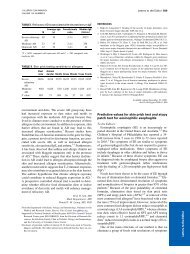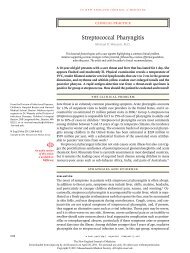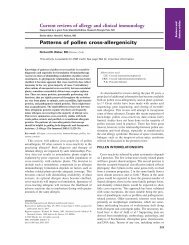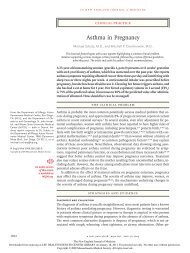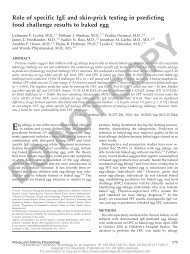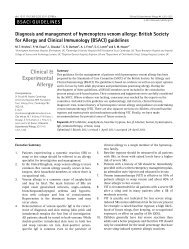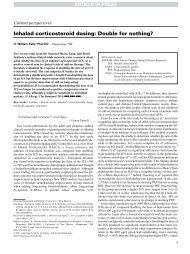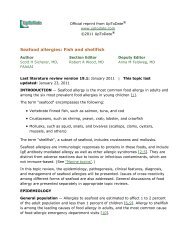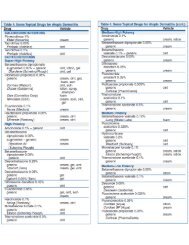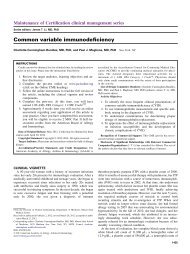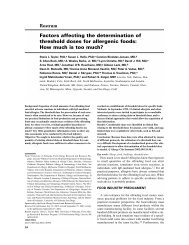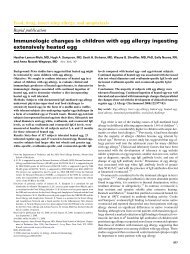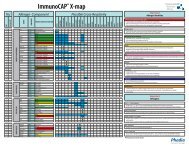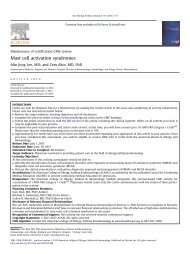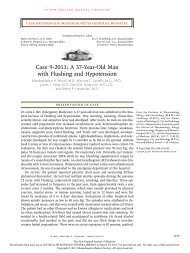Diagnosis and management of oral allergy syndrome ... - AInotes
Diagnosis and management of oral allergy syndrome ... - AInotes
Diagnosis and management of oral allergy syndrome ... - AInotes
Create successful ePaper yourself
Turn your PDF publications into a flip-book with our unique Google optimized e-Paper software.
wishes to continue eating cooked forms <strong>of</strong> the food that are not currently causing<br />
symptoms. We typically explain to the patient that the culprit food is more likely to<br />
cause dangerous reactions, compared to other foods, <strong>and</strong> suggest that they convert<br />
to strict avoidance if the symptoms seem to be progressing over time.<br />
INDICATIONS FOR EPINEPHRINE — We advise patients with one or more <strong>of</strong> the<br />
following characteristics to carry epinephrine autoinjectors:<br />
Systemic symptoms in the past.<br />
Established <strong>allergy</strong> (regardless <strong>of</strong> the severity <strong>of</strong> past reactions) to peanut,<br />
tree nuts, or mustard, as these foods are associated with higher rates <strong>of</strong><br />
systemic reactions.<br />
It is also our practice to advise patients with any <strong>of</strong> the following characteristics to<br />
carry epinephrine:<br />
Reactions <strong>of</strong> any severity to cooked plant foods.<br />
Reactions to particular foods, if practicing in an area where that food is<br />
associated with severe reactions, such as peach or apple in Mediterranean<br />
countries [39-41]. The phenomenon <strong>of</strong> certain foods causing more severe<br />
reactions in patients in specific geographical locales is discussed in more detail<br />
elsewhere. (See "Pathogenesis <strong>of</strong> <strong>oral</strong> <strong>allergy</strong> <strong>syndrome</strong> (pollen-food <strong>allergy</strong><br />
<strong>syndrome</strong>)".)<br />
For patients with isolated oropharyngeal symptoms in the past <strong>and</strong>/or positive SPT<br />
using a commercial extract, we discuss with the patient or parent the unknown<br />
natural history <strong>of</strong> this condition <strong>and</strong> the uncertain risk <strong>of</strong> systemic reactions. If the<br />
patient/parent's preference is to have access to epinephrine following that<br />
discussion, then we generally supply it. (See 'Food avoidance <strong>and</strong> patient<br />
education' above.)<br />
OTHER MANAGEMENT ISSUES<br />
Caution with anti-ulcer treatments — Anti-ulcer drugs increase gastric pH <strong>and</strong><br />
may impair digestion <strong>of</strong> food proteins. There are no published studies directly<br />
examining the clinical effect <strong>of</strong> anti-ulcer therapies on PFAS, although the results <strong>of</strong><br />
studies <strong>of</strong> other food allergies are <strong>of</strong> interest [42-44]:<br />
In a mouse model, anti-ulcer drugs were reported to predispose to allergic<br />
reactions to caviar caused by unstable allergens that would be normally<br />
destroyed by digestion [42].<br />
Following a three month course <strong>of</strong> anti-ulcer drugs, 5 <strong>of</strong> 153 patients



